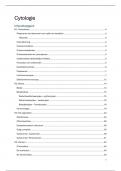Samenvatting
Samenvatting Cel II: Cytologie
- Vak
- Instelling
Dit is een zeer volledige samenvatting van het partim cytologie uit cel II, gegeven door Jolanda Van Hengel. In de samenvatting staat alles wat gekend moet zijn voor het examen + de nodige afbeeldingen. Ik behaalde 18/20 door deze samenvatting te leren.
[Meer zien]





